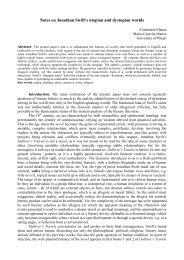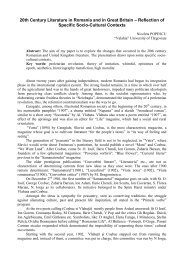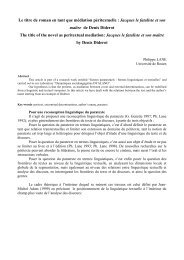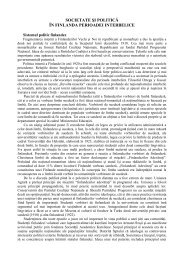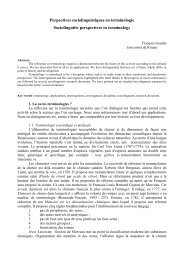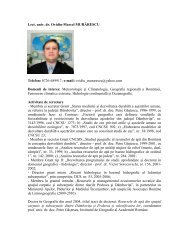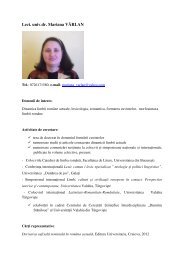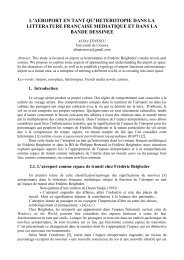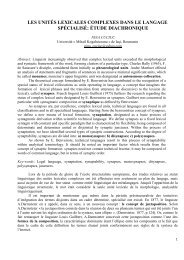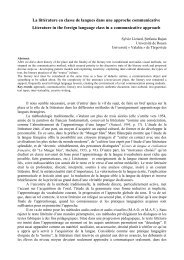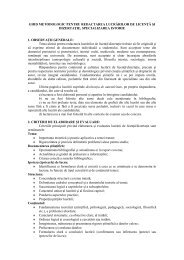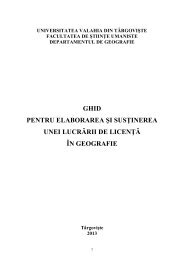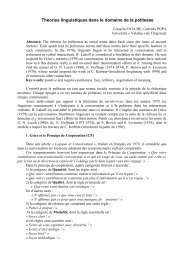THE ANNALS OF „VALAHIA” UNIVERSITY OF TÂRGOVIŞTE
THE ANNALS OF „VALAHIA” UNIVERSITY OF TÂRGOVIŞTE
THE ANNALS OF „VALAHIA” UNIVERSITY OF TÂRGOVIŞTE
You also want an ePaper? Increase the reach of your titles
YUMPU automatically turns print PDFs into web optimized ePapers that Google loves.
26<br />
2. CUVÂNT (WORD)<br />
The Annals of „Valahia” University of Târgovişte<br />
Term by excellence abstract today, CUVÂNT comes from the Latin<br />
conventus, meaning “gathering, reunion” (from the verb convenio “to gather, to<br />
reunite; to relate well with”, a derivative of venio “a veni”). This semantic<br />
evolution is as logical as possible: the gathering together of several people is a<br />
chance for conversation, for... word. So, we can say that this term bears, in a visible<br />
way, even since its birth, the mark of the social nature of the language, considered<br />
as a means of communication among people. At the same time, the word, in the<br />
sense of “sermo”, is “a gathering” of ideas, “a reunion” of some particular ideas<br />
into an idea of general value. The primary meaning of conventus is recognized in<br />
the Romance language descendants: Fr. couvent, It. convento etc.<br />
In some languages, the two meanings coexist, as in the case of the Albanian<br />
kuvënd, coming from Latin as well, which means both “gathering, reunion” and<br />
“conversation, word”. Both of these senses appear as well in cantio, -onis<br />
“gathering of people; sermon, discourse”, which seems to be, etymologically, a<br />
particular form of conventio. In Greek, omilia (òµιλία) also has the same meanings<br />
as Lat. cantio, Alb. kuvënd.<br />
In Romanian there are as well other words with similar evolutions to the<br />
Latin conventus (see taifas, a synonym with the meaning “familiar, pleasant,<br />
intimate conversation” (note 2)).<br />
In the Aromanian dialect, sobor “reunion” (in Dacoromanian: sobor<br />
preoŃesc), from the Old Slav sǔborǔ “reunion”, lies at the basis of zbor “word,<br />
discourse, gathering”, from which the verb zburăscu “to speak” derives (note 3);<br />
compare as well the Serbo-Croatian zbor “gathering; word”, zboriti “to speak, to<br />
give a speech”; Bg. sbor “gathering”, from which the old and regional<br />
dacoromanian zbor comes, meaning “market, fair, annual fair”, and less often<br />
“public market”, while in Banat it can also mean “conversation” (note 4).<br />
The logical connection between “gathering of people”, then “reunion of<br />
ideas” and “word, conversation, discourse” is highlighted by many other examples<br />
from different languages (note 5).<br />
Developing by means of a process of abstractization, cuvânt has acquired a<br />
rich array of senses, of which the most important is, of course, that of “linguistic<br />
unit, utterance, term”.<br />
In Old Romanian CUVÂNT was more frequently used than today and had<br />
more numerous meanings.<br />
Compared to vorbă, its most important synonym, cuvânt has aquired the<br />
nobility of written language; it is adequate for the language of culture and science,<br />
while vorbă characterizes the popular aspect of the language and its affective areas.<br />
This distinction, made, of course, with all the approximation, can be illustrated by a




